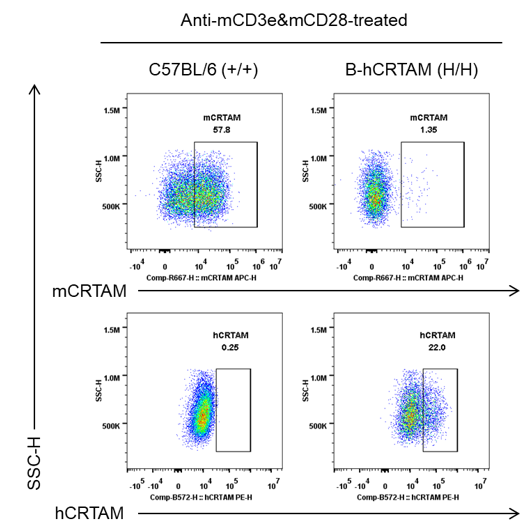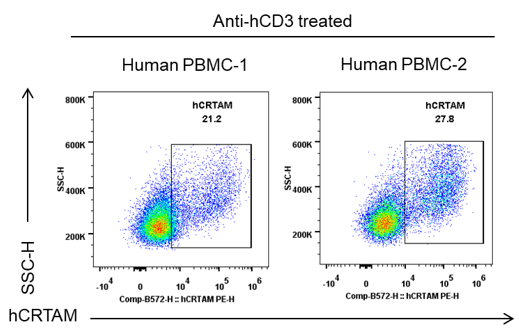| Strain Name |
C57BL/6-Crtamtm1(CRTAM)Bcgen/Bcgen
|
Common Name | B-hCRTAM mice |
| Background | C57BL/6 | Catalog number | 112532 |
|
Aliases |
CRTAM; CD355
|
||

Strain specific CRTAM expression analysis in homozygous B-hCRTAM mice by flow cytometry. CD8+ T cells were sorted from the splenocytes in wild-type C57BL/6 mice (+/+) and homozygous B-hCRTAM mice (H/H) and stimulated with anti-mCD3e in vitro (0.5 μg/mL, stimulation for 72 hours) and anti-mCD28 in vitro (1 μg/mL, stimulation for 72 hours). Protein expression was analyzed with anti-mouse CRTAM antibody (Biolegend, 142007) and anti-human CRTAM antibody (Biolegend, 339106) by flow cytometry. Mouse CRTAM was exclusively detectable in wild-type mice. Human CRTAM was exclusively detectable in homozygous B-hCRTAM mice but not in wild-type mice.
Protein expression analysis in CD8+ T cells of human T cells

Human CRTAM expression analysis in human T cells by flow cytometry. Human T cells were stimulated with anti-hCD3 in vitro (20 μg/mL, stimulation for 48 hours), and analyzed by flow cytometry with species-specific anti-CRTAM antibody (Biolegend, 339106). Human CRTAM was exclusively detectable in human T cells by anti-human CRTAM antibody. Human hPB CD3+ Cells purchased from Milestone Biotechnologies.

Strain specific analysis of CRTAM mRNA expression in wild-type C57BL/6 mice and B-hCRTAM mice by RT-PCR. Spleen RNA were isolated from wildtype C57BL/6 mice (+/+) and homozygous B-hCRTAM mice (H/H), then cDNA libraries were synthesized by reverse transcription, followed by PCR with mouse or human CRTAM primers. Mouse Crtam mRNA were detectable only in wild-type C57BL/6 mice. Human CRTAM mRNA was detectable only in homozygous B-hCRTAM mice but not in wild-type mice.
Functional analysis







 +86-10-56967680
+86-10-56967680 info@bbctg.com.cn
info@bbctg.com.cn